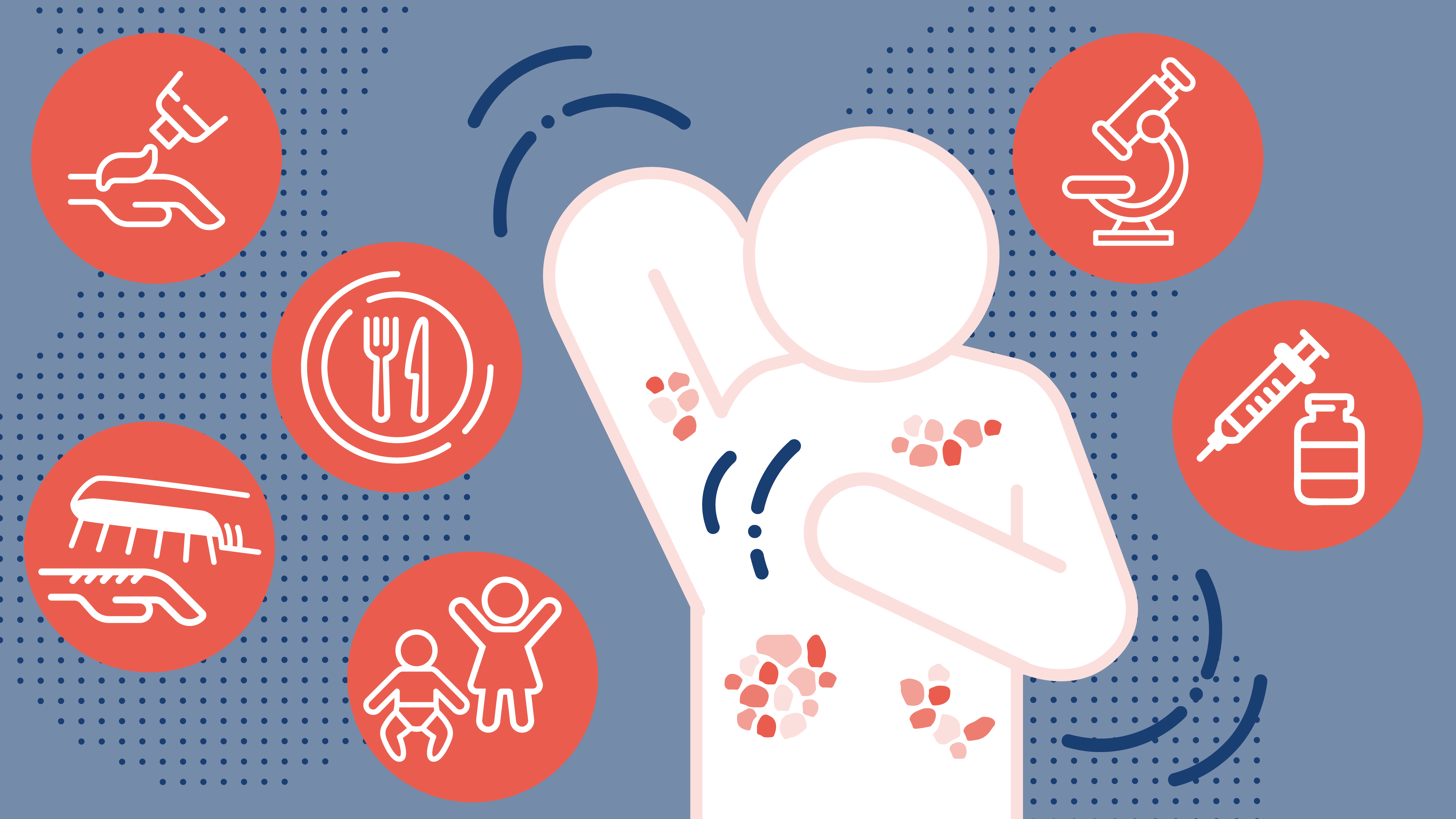Six key studies on psoriasis

Psoriasis is a skin condition that can cause itchy and sore red skin, painful and swollen joints, as well as depression. People with bad psoriasis are also more likely to have heart problems. Psoriasis is common in all ages – affecting around two in 100 people in the UK.
For some people psoriasis is just a minor irritation, but for others it can have a significant impact on their quality of life.
People who suffer from psoriasis produce too many skin cells. Skin cells are normally made and replaced every three to four weeks, but in psoriasis this only takes between a few days causing scaling of the skin. The skin is inflamed which make the areas red, sore and itchy.
Mild psoriasis is treated with emollients to moisturise the skin and creams that reduce the inflammation and scaling. Where these don’t work or the condition is more severe, it can be treated with phototherapy, which involves exposing the affected skin to types of ultraviolet light.
There are also types of tablet or injections that can be given for more severe forms of psoriasis. These prevent skin cell production, inflammation or suppress the immune system.
New research into psoriasis is happening all the time. Below are six key trials, looking at different ways to diagnose, manage and treat the condition.
1. Looking at diet and exercise
The APPLE study (Asking People with Psoriasis about their Lifestyle and Eating) aims to help address one of the commonest questions that people living with psoriasis ask: whether changes in diet may or may not be helpful for their skin. The researchers will look at people’s diets, as well as lifestyle factors such as sleep and exercise, to see whether particular foods trigger their psoriasis or whether any dietary changes may have helped. A small trial will also compare two popular diets – the Mediterranean diet and ‘Intermittent Fasting’ – to see if either of these improve psoriasis. This trial is funded by the Psoriasis Association and run by Kings College London.
2. New technology to measure skin moisture
This study is looking at whether a new imaging technology – called Terahertz scanning – can accurately be used to measure the dryness and thickness of human skin. Terahertz scanning uses low power levels and has far less impact that CT scans or x-rays, so potentially could be used more frequently. The research is looking at both people with skin conditions causing inflammation, such as psoriasis as well as more serious conditions such as skin cancer. For those with conditions like psoriasis, people will have the water content of their skin measured before and after the application of common moisturising skin creams, to help understand how best to use these treatments in future. This trial is funded by Cancer Research UK and run by University Hospitals Coventry and Warwickshire NHS Trust.
3. Evaluating monitoring strategies
People with inflammatory conditions, including psoriasis, who are treated with some long-term medications, may require regular tests to check their blood, liver and kidneys. As side effects of the medication are rare after the first year of treatment, research is underway to see if the amount of testing undertaken could be safely reduced. This study complements that research, by measuring how often patients attend their monitoring tests, and find out what they, and their nurses and doctors, think about the current monitoring strategy and possible changes to it. This study is funded and run by the University of Nottingham.

Psoriasis can affect people at any age, but all treatments are developed and trialled first on adults. More treatments, particularly biological therapies, are needed for babies and children with psoriasis and the next three studies are looking at these:
4. Testing a new long-term treatment in children
Deucravacitinib is a drug that suppresses both inflammation and immune response and has shown good results in adults with moderate to severe psoriasis, compared both to a current treatment and a placebo. It’s not yet been approved for use in the UK. This trial is checking the appropriate dose that will be safe and effective to use with children aged four years and over. As the treatment is designed to be used long-term, the trial is running for five years to follow up the children who’ve received the drug. Deucravacitinib is developed by Bristol-Myers-Squibb and the company is sponsoring the study.
5. Monitoring long-term safety in children
The drug ustekinumab has been approved since 2009 for use in adults with severe psoriasis that has failed to respond to other treatments. The drug works by interfering with substances in the immune system that signal to other cells to cause inflammation. Ustekinumab is given by injection every three months. In 2017, the drug was also approved for use in children aged six years and above, and this study started at the same time to monitor its long-term safety in children. The trial, run in London, Salford and Cardiff, is recruiting children who were between six and 17 years old when they first received the drug. It will run until 2032, to help understand whether or not taking ustekinumab over a long period of time increases the risk of severe infections, cancer, or other auto-immune conditions, as well as monitoring any impacts on children’s growth and development. Previous research has shown no increased risk of serious infections in adults treated with biologic drugs like ustekinumab. The drug has been developed by Janssen-Cilag and the company is also funding the trial.
6. Determining dosage and treatment length
Another drug called risankizumab acts in a similar way to ustekinumab, blocking chemical messages that work in the immune system that promote inflammation. It is a relatively new medication that was licensed for use in adults in England and Wales in 2019 and in Scotland later the same year. It is used in patients with moderate to severe psoriasis who haven’t responded well to other treatments. This study is looking at its use in children aged six years and over, who have moderate or severe psoriasis. The aim of the study is to see what dosage and treatment length will have an impact on symptoms of the condition. The trial is running in London, Plymouth, Exeter, Camberley and Glasgow. The drug has been developed by AbbVie and the company is funding the study.
Collecting 'real-world' data on biologic treatments
Alongside these trials, long-term safety and effectiveness of biologic treatments for psoriasis is being monitored through the British Association of Dermatologists Biologics and Immunomodulators Register (BADBIR). This register is collecting ‘real world’ data – i.e. non-clinical trial data – and anyone who is taking biologic treatments for their psoriasis can ask for their information to be included in this register.
How you can get involved with research
Sign up to Be Part of Research to take part in a range of health and care research. You can also visit our 'How to take part' page to find out more about research trials that are happening now and in the future.
Our 'what happens on a study' page provides more information on how trials work. And if taking part in a study doesn’t feel right at the moment, there are other ways to get involved in research.




